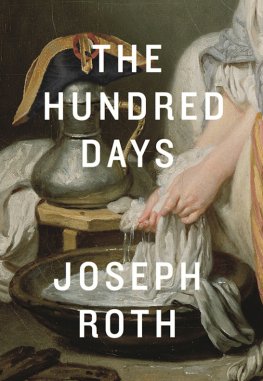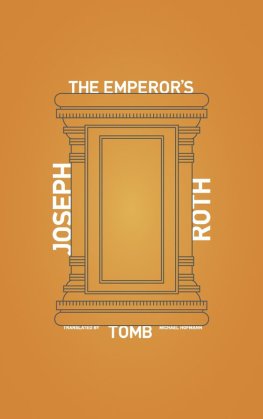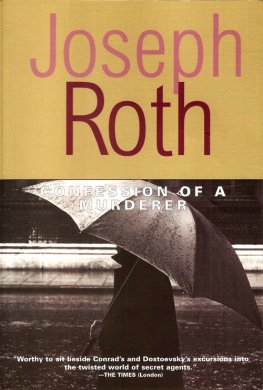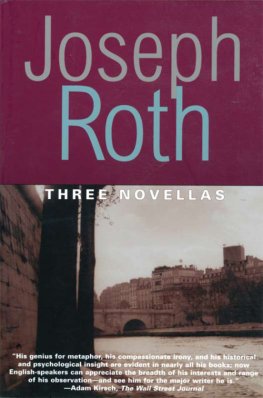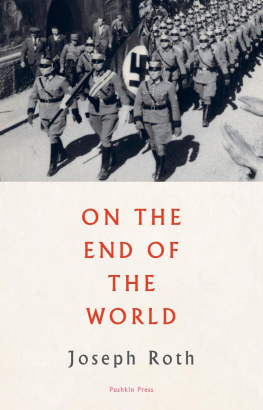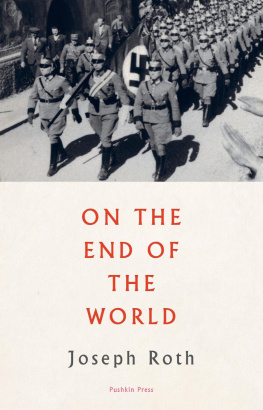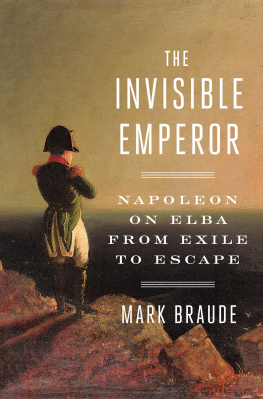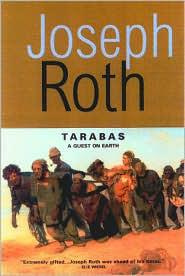Joseph Roth - The Hundred Days
Here you can read online Joseph Roth - The Hundred Days full text of the book (entire story) in english for free. Download pdf and epub, get meaning, cover and reviews about this ebook. year: 2014, publisher: New Directions, genre: Prose. Description of the work, (preface) as well as reviews are available. Best literature library LitArk.com created for fans of good reading and offers a wide selection of genres:
Romance novel
Science fiction
Adventure
Detective
Science
History
Home and family
Prose
Art
Politics
Computer
Non-fiction
Religion
Business
Children
Humor
Choose a favorite category and find really read worthwhile books. Enjoy immersion in the world of imagination, feel the emotions of the characters or learn something new for yourself, make an fascinating discovery.
- Book:The Hundred Days
- Author:
- Publisher:New Directions
- Genre:
- Year:2014
- Rating:4 / 5
- Favourites:Add to favourites
- Your mark:
- 80
- 1
- 2
- 3
- 4
- 5
The Hundred Days: summary, description and annotation
We offer to read an annotation, description, summary or preface (depends on what the author of the book "The Hundred Days" wrote himself). If you haven't found the necessary information about the book — write in the comments, we will try to find it.
The Hundred Days — read online for free the complete book (whole text) full work
Below is the text of the book, divided by pages. System saving the place of the last page read, allows you to conveniently read the book "The Hundred Days" online for free, without having to search again every time where you left off. Put a bookmark, and you can go to the page where you finished reading at any time.
Font size:
Interval:
Bookmark:
Joseph Roth
The Hundred Days
Book One. The Return of the Great Emperor
I
The sun emerged from the clouds, bloody-red, tiny, and irritable, but was quickly swallowed up again into the cold gray of the morning. A sullen day was breaking. It was March 20, a mere day before the start of spring. One could see no sign of this. It rained and stormed across the whole land, and the people shivered.
The weather in Paris had been stormy since the previous night. The birds fell silent after a quick morning greeting. Cold and spiteful wisps of mist rose insidiously from the cracks between the cobbles, moistening anew the stones that had just been blown dry by the morning wind. The mist lingered about the willows and chestnuts in the parks and hovered along the edges of the avenues, causing the nascent tree buds to tremble, chasing clearly visible shivers along the damp backs of the patient livery horses and forcing down to ground level the industrious morning smoke that was here and there attempting to rise from chimneys. The streets smelled of fire, mist, and rain, of damp clothes, of lurking snow clouds and temporarily averted hail, of unfriendly winds, soaked leather, and foul sewers.
Despite this, the citizens of Paris did not remain in their homes. They began to gather in the streets at an early hour. They assembled themselves before the walls onto which broadsides had been affixed. These papers carried the farewell message of the King of France. Barely legible, they looked tear-soaked, for the nights rain had smeared the freshly inked letters and in places also dissolved the glue with which they were adhered to the stone. From time to time, a stormy gust of wind would blow a sheet completely off the wall and deposit it into the black mud of the street. These farewell words of the King of France met an ignoble fate, being ground into the muck of the road under the wheels of wagons, under the hooves of horses, and under the indifferent feet of pedestrians.
Many of the loyalists regarded these sheets with a wistful devotion. The heavens themselves seemed unfavorably disposed to him. Gales and rains zealously endeavored to obliterate his farewell message. Amid wind and rain, he had departed his palace and residence on the previous evening. Do not make my heart heavy, my children! he had said when they got on their knees and begged him to stay. He could not stay; the heavens were against him. . everyone could see this.
He was a good king. Few loved him, but many in the country liked him. He did not have a kind heart, but he was royal. He was old, portly, slow, peaceable, and proud. He had known the misfortune of homelessness, for he had grown old in exile. Like every unfortunate, he did not trust anyone. He loved moderation, peace, and quiet. He was lonely and aloof for true kings are all lonely and aloof. He was poor and old, portly and slow, dignified, deliberate, and unhappy. Few loved him, but there were many in the land who liked him.
The old King was fleeing a menacing shadow the shadow of the mighty Emperor Napoleon, who had for the last twenty days been on the march toward the capital. The Emperor cast his shadow before him, and it was a ponderous one. He cast it over France and over practically the entire world. He was known throughout France and the entire earth. His majesty was not derived through birth. Power was his majesty. His crown was a conquest and a capture, not an inheritance. He came from an unknown family. He even brought glory to his nameless ancestors. He had conferred splendor upon them instead of gaining it through them, as was the case for those who were born emperors and kings. Thus he was equally related to all the nameless masses as he was to old-fashioned majesty. By exalting himself he ennobled, crowned, and exalted each and every one of the nameless masses, and they loved him for that. For many years he had terrorized, besieged, and reined in the great ones of this earth, and that was the reason the commoners saw him as their avenger and accepted him as their lord. They loved him because he seemed to be one of them and because he was nonetheless greater than them. He was an encouraging example to them.
The Emperors name was known across the world but few actually knew anything about him. For, like a true king, he was also lonely. He was loved and hated, feared and venerated, but seldom understood. People could only hate him or love him; fear him or worship him as a god. He was human.
He knew hate, love, fear, and veneration. He was strong and weak, daring and despondent, loyal and treacherous, passionate and cold, arrogant and simple, proud and humble, powerful and pitiable, trusting and suspicious.
He promised the people liberty and dignity but whoever entered into his service surrendered their freedom and gave themselves completely to him. He held the people and the nations in low regard, yet nonetheless he courted their favor. He despised those who were born kings but desired their friendship and recognition. He believed in God yet did not fear Him. He was familiar with death but did not want to die. He placed little value upon life yet wished to enjoy it. He had no use for love but wanted to have women. He did not believe in loyalty and friendship yet searched tirelessly for friends. He scorned the world but wanted to conquer it anyway. He placed no trust in men until they were prepared to die for him thus he made them into soldiers. So that he might be certain of their affection, he taught them to obey him. In order for him to be certain of them, they had to die. He wished to bring happiness to the world, and he became its plague. Yet he was loved even for his weak ways. For when he showed himself to be weak, the people realized he was one of their own kind, and they loved him because they felt a connection to him. And when he showed himself to be strong, they also loved him for that very reason, because he seemed not to be one of them. Those who did not love him hated him or feared him. He was both firm and fickle, true and treacherous, bold and shy, exalted and modest.
And now he was standing at the gates of Paris.
The orders that the King had introduced were discarded, in some instances out of fear and in others out of elation.
The colors of the King and his royal house had been white. Those who had acknowledged him wore white bows on their jackets.
But, as if by accident, hundreds had suddenly lost their white bows. Now they lay, rejected and disgraced butterflies, in the black muck of the streets.
The flower of the King and his royal house had been the virginally pure lily. Now, hundreds of lilies, of silk and cloth, lay discarded, disowned, and disgraced in the black muck of the streets.
The colors of the approaching Emperor, however, were blue, white, and red; blue as the sky and the distant future; white as the snow and death; and red as blood and freedom.
Suddenly, thousands of people appeared in the streets of the city wearing blue-white-red bows in their buttonholes and on their hats.
And instead of the proud, virginal lily, they wore the most unassuming of all flowers, the violet.
The violet is a humble and sturdy flower. It embodies the virtues of the anonymous masses. Nearly unrecognized, it blooms in the shadows of imposing trees, and with a modest yet dignified precocity it is the first of all the flowers to greet the spring. And its dark-blue sheen is equally reminiscent of the morning mist before daybreak and the evening mist before nightfall. It was the Emperors flower. He was known as the Father of the Violet.
Thousands of people could be seen streaming from the outskirts of Paris toward the center of the city, toward the palace, all of them adorned with violets. It was one day before the start of spring, an unfriendly day, a sullen welcome for spring. The violet, however, the bravest of all flowers, was already blooming in the woods outside the gates of Paris. It was as though these people from the suburbs were carrying the spirit of spring into the city of stone, toward the palace of stone. The freshly plucked bouquets of violets shone a radiant blue at the ends of the sticks held aloft by the men, between the warm and swelling breasts of the women, on the hats and caps that were being waved high in the air, in the joyful hands of the workers and craftsmen, on the swords of the officers, on the drums of the old percussionists and the silver cornets of the old trumpeters. At the front of some of the groups marched the drummers of the old Imperial Army. They rapped out old battle melodies on their old calfskin drums, let their drumsticks fly through the air and caught them again, like slender homing pigeons, in fatherly hands held open in welcome. Heading up other groups, or contained within their midst, marched the ancient trumpeters of the old army, who from time to time set their instruments upon their lips and blew the old battle calls of the Emperor, the simple, melancholy calls to death and triumph, each of which reminded a soldier of his own pledge to die for the Emperor and also of the last sigh of a beloved wife before he left her to lay down for the Emperor. In the midst of all the people, raised upon shoulders, were the Emperors old officers. They swayed, or rather were swayed, above the surging heads of the crowd like living, human banners. They had their swords drawn. On the sword tips fluttered their hats, like little black flags decorated with the tricolored cockades of the Emperor and the people of France. And from time to time, as if compelled to release the oppressive longing that had quickly built up in their hearts once again, the men and women cried out: Long live France! Long live the Emperor! Long live the people! Long live the Father of the Violet! Long live liberty! Long live the Emperor! And once more: Long live the Emperor! Often, some enthusiast from within the center of the crowd would begin to sing. He sang the old songs of the old soldiers, from battles of days past, the songs that celebrate mans farewell to life, his prayer before death, the sung confession of the soldier lacking the time for final exoneration. They were songs proclaiming love of both life and death. They were tunes in which one could hear undertones of marching regiments and clattering muskets. Suddenly someone struck up a song that had not been heard for a long time, the Marseillaise and all the many thousands joined in singing it. It was the song of the French people. It was the song of liberty and duty. It was the song of the motherland and of the whole world. It was the song of the Emperor just as the violet was his flower, as the eagle was his bird, as white, blue, and red were his colors. It glorified victory and even cast its sheen upon lost battles. It gave voice to the spirit of triumph and its brother death. Within it was both despair and reassurance. Anyone who sang the Marseillaise to himself joined the powerful community and fellowship of the many whose song it was. And anyone who sang it in the company of many others could feel his own loneliness in spite of the crowd. For the Marseillaise proclaimed both victory and defeat, communion with the world and the isolation of spirit, mans deceptive might and actual powerlessness. It was the song of life and the song of death. It was the song of the French people.
Font size:
Interval:
Bookmark:
Similar books «The Hundred Days»
Look at similar books to The Hundred Days. We have selected literature similar in name and meaning in the hope of providing readers with more options to find new, interesting, not yet read works.
Discussion, reviews of the book The Hundred Days and just readers' own opinions. Leave your comments, write what you think about the work, its meaning or the main characters. Specify what exactly you liked and what you didn't like, and why you think so.

